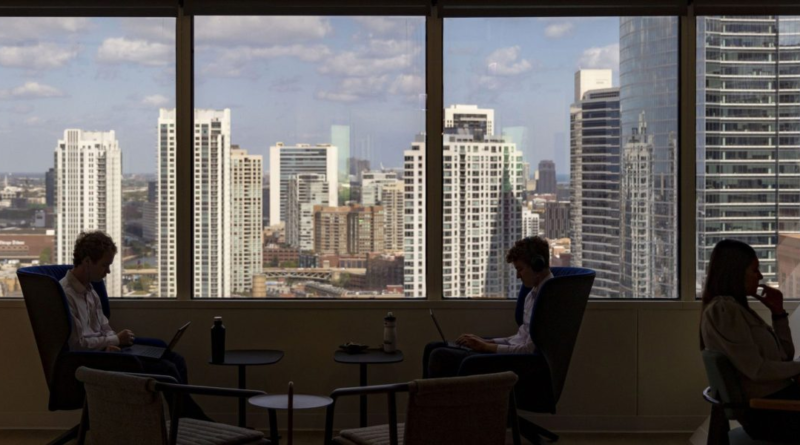RTO battle heats up as quarter of companies plan office investment
For many employees, the debate around returning to the office increasingly felt like a “when,” not “if” in 2023, as major CEOs sounded the drum on getting their staffers back under their noses.
This year, it looks like those employers are planning to put their money where their mouth is by beefing up their desk space and embracing a hybrid model of work that may end many workers’ dreams of a fully remote future.
According to a new report by French consulting group Capgemini, a quarter of businesses are planning to increase spending on real estate in 2024 to accommodate the return of their workers.
It marks a steep rise from the start of 2023 when just 4% of businesses told the group they were planning to up real estate investment through the year.
Rather than indicating a full return to the office five days a week, though, Capgemini’s research suggests it is part of a wider plan among several organizations to shift to a longer-term hybrid working model.
A new ‘equilibrium’
Capgemini, valued at nearly $37 billion, works as a technology and sustainability consultant with some of the world’s biggest companies.
The group’s CEO, Aiman Ezzat, told Fortune that those clients were now starting to find an “equilibrium” through hybrid work between flexibility for workers and the face-to-face interactions demanded by managers.
Ezzat personally embraces a hybrid model by getting his 342,000 Capgemini staff into the office three days a week, an initiative he started in Europe as COVID-19 restrictions wound down.
He says six months ago the company’s Chicago office was empty on a Wednesday, but now he would struggle to find a seat on the same day of the week.
“People are coming back, the interactions are happening, the intimacy is being rebuilt,” Ezzat said of his own workforce.
“That hybrid model is starting to operate in a more satisfactory way. And people find pleasure in coming to the office to interact with others, so new rituals are being built in a certain way.”
In December, French multinational Schneider Electric crystallized this vision in comments in a Capgemini report.
“Hybrid work will be about mass customization, allowing every employee to customize working environments to their personal circumstances, career, or life stage,” the group’s chairman Jean-Pascal Tricoire said.
RTO mandates ramping up in 2024
News of fresh investment in the flagging real estate sector will come as a welcome relief to developers and office managers, who have been left sweating as swathes of expensive Grade A office space go unused.
Last week, the Wall Street Journal reported that a fifth of office space in the U.S. was now empty, the highest share since 1979.
Ermengarde Jabir, senior economist with Moody’s Analytics, told Fortune earlier this month that the outlook for commercial real estate was muted in 2024 as businesses undergo a “recalibration.”
Evidence from last year suggested that recalibration would involve companies downsizing their office space.
Luxury retailer Neiman Marcus dumped half a million feet of office space and embraced a work-from-anywhere policy among its workforce. This was in part driven by the company’s previous bankruptcy and an urgent need to cut costs.
Other businesses are taking a more strategic approach to reducing or altering their corporate real estate footprint.
Last year, Google asked returning employees to share desks with a “partner” as they came in on alternating days. Mark Zuckerberg’s Meta paid $181 million to end a lease on its London property in September as part of layoffs and a push towards hybrid work.
The findings from Capgemini are the latest reminder for workers that the debates over where they work will only intensify this year.
The prospect of spending money on their commute has left employees demanding concessions including pay rises and free lunches if they have to come back to the office.
Hybrid models have increasingly been pushed by companies as a compromise to avoid these costly concessions. It’s also seen as a way of utilizing those expensive long-term leases on office space deals signed before the pandemic.
But not all CEOs are confident, or even hopeful, that the hybrid model will triumph as the default future of work.
More than 60% of bosses surveyed by KPMG last year said they expected a full return to in-office working by 2026.
However, many of those CEOs thought incentives like salary bumps and even more favorable assignments would be offered to entice workers back full-time.
CEOs more optimistic about 2024 business landscape
Capgemini’s report on investment priorities for 2024 finds the CEOs it surveyed in brighter spirits than at the start of 2023.
Businesses at the time were still dealing with high levels of inflation with the expectation of further interest rate rises on the horizon. An underperforming stock market in 2022 put extra dampeners on spirits to start last year.
This year though, 56% of surveyed bosses said they were optimistic about the outlook for the global economy in 2024, compared with 42% last year. Confidence was higher in Sweden, the U.K., and the U.S., and lower in struggling European economies like Germany and Italy.
Alongside investment in real estate, businesses are also expecting to continue splurging on AI this year, while also putting resources into customer experience and talent.
In 2023, Capgemini itself pledged €2 billion ($2.2 billion) towards enhancing its AI capabilities over the next few years. This would involve the company doubling its headcount in its data and AI teams by 2026.




